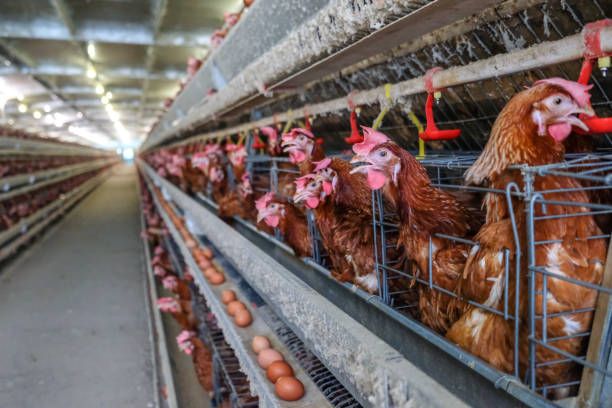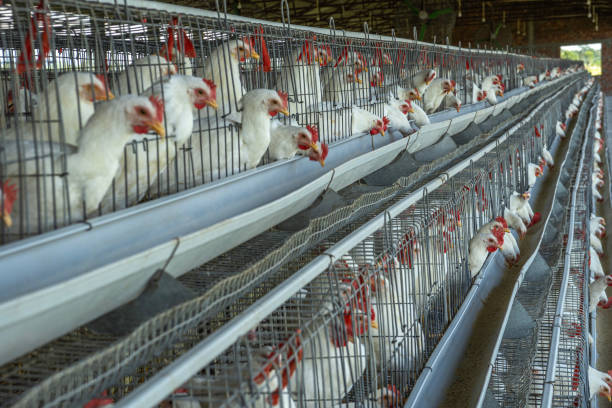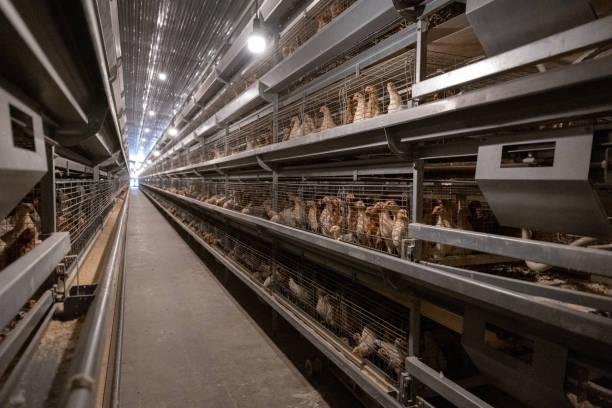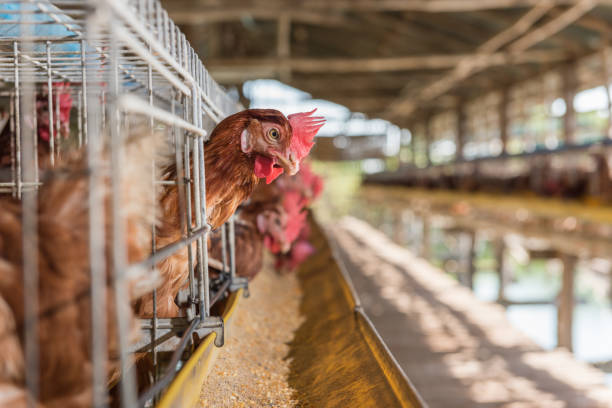
Cost-Effective Broiler Housing: Cages for 30,000 Bird Farms in South Africa
Cost-Effective Broiler Housing: Cages for 30,000 Bird Farms in South Africa
Setting up a broiler farm is a serious venture, especially when you’re talking about a farm designed to house 30,000 birds in a place like South Africa. One of the biggest factors in making your farm a success is finding a housing solution that’s not only good for the birds but also good for your wallet. Broiler cages have emerged as a cost-effective option, and here’s a detailed look at why they might be the perfect solution for your farm.
Why Choose Broiler Cages?
Broiler cages offer several advantages over traditional deep litter systems, making them an increasingly popular choice for poultry farmers aiming for efficiency and profitability.
Better Space Utilization: Cages allow you to house more birds in the same area compared to floor systems. This is because cages utilise vertical space. For a 30,000-bird farm, this enhanced space efficiency can significantly reduce the overall land and building costs.
Improved Hygiene: Since the chickens are separated from their waste, the risk of disease is reduced. This leads to healthier birds and lower mortality rates. The manure falls through the cage floor and can be easily collected and removed, further minimizing the risk of disease outbreaks.
Enhanced Bird Health: The reduced contact with litter and waste protects the birds from common poultry diseases. Plus, it helps prevent the spread of parasites like coccidia, leading to healthier flocks.
Easier Management: Cages make it easier to monitor and manage your flock. You can quickly spot any sick or injured birds, and administering medication or vaccinations becomes much more efficient.
Reduced Feed Wastage: Cages are designed to minimize feed wastage, which can save you a significant amount on feed costs over time. The feed is contained within the cage, preventing birds from scattering it around.
Better Meat Quality: Birds raised in cages tend to have better meat quality due to reduced bruising and contamination. They also experience more uniform growth rates, which is beneficial for processing.
Climate Control: Cages enable better climate control within the poultry house. Ventilation and temperature can be more effectively managed, ensuring a comfortable environment for the birds regardless of external weather conditions.
Cost-Effectiveness: The Numbers Speak for Themselves
Investing in broiler cages may seem like a significant upfront cost, but when you break it down, the long-term savings and increased profitability make it a cost-effective choice, especially when considering the specific context of South African broiler farming.
Initial Investment: The initial cost of setting up a cage system includes the purchase of the cages, installation, and any necessary modifications to the existing structure. While this could be higher than setting up a deep litter system, the benefits in terms of space utilization, bird health, and management efficiency often offset the higher initial costs.
Operational Costs: Daily operational costs predominantly consists of feed, labor, and utilities (electricity and water). Cages minimize feed wastage, reducing feed costs, also, caged systems often require less labor than deep litter systems, as tasks like feeding, watering, and waste removal can be automated.
Maintenance Costs: Maintenance involves regularly cleaning, checking, and fixing the cage system, and this includes replacing broken parts as needed. Good-quality cages are durable and require minimal maintenance, which helps reduce long-term operational costs.
Return on Investment (ROI): Better feed conversion ratios, reduced mortality rates, and higher stocking densities contribute to a higher ROI, making broiler cages a financially sound choice for South African farmers.
Designing Your 30,000-Bird Broiler Farm with Cages
Designing the housing for a 30,000-bird broiler farm requires careful thinking and planning to make sure everything runs smoothly and the birds are comfortable.
Space Calculation: To figure out the space needed for 30,000 birds on broiler cages, it’s important to know how many birds each cage can hold and how much space each bird needs. Depending on the breed and how long they’ll be kept, this could be about 0.05-0.07 square meters per bird.
Cage Layout: There are different ways to set up the cages, like in rows with aisles in between for workers to move around, or in blocks to make the most of the space. The layout should make it easy to move the birds, feed them, and clean.

Ventilation Systems: Good ventilation is key to keeping the air fresh, stopping moisture from building up, and keeping the temperature steady. This can be achieved using natural ventilation or by installing fans and air inlets for a mechanical ventilation system.
Feeding and Watering Systems: Automatic feeding and watering systems can save time and labor. These systems make sure all the birds get enough feed and water without waste.
Waste Management Systems: Efficient waste management is important for stopping odors, controlling pests, and following environmental rules. Systems like belt-removal or sloping floors can make it easier to collect and get rid of manure.
Lighting: Proper lighting is important for bird growth and wellbeing. Farmers can use artificial lights or let in natural light to create a lighting schedule that promotes bird health and growth.
Key Considerations for Broiler Cage Systems in South Africa

When getting broiler cages for a farm in South Africa, there are a few things to keep in mind to make sure they meet the needs of the local environment and industry.
Climate Conditions: South Africa has different climates, so picking cages that can handle the local weather is important. In hot areas, cages should have good ventilation and cooling systems to keep the birds from getting too hot.
Local Regulations: It’s important to know and follow South Africa’s rules for poultry farming, which cover things like animal welfare, waste disposal, and building standards.
Material Quality: Choosing high-quality materials that can withstand the local climate and farming conditions is important for keeping the cages in good shape and lasting a long time.
Supplier Reputation: Picking a reliable supplier with experience in the South African market is important for getting good quality cages and support.
Maintenance and Support: Getting cages that are easy to maintain and finding a supplier that offers good technical support and spare parts is important for keeping the farm running smoothly.
Cost Analysis: Doing a thorough cost analysis that looks at the initial cost, running costs, and possible returns is important for making sure the investment in broiler cages is financially smart.
Choosing the Right Broiler Cage System
With myriad options available, selecting the right broiler cage system is a critical decision that can significantly impact the efficiency, productivity, and profitability of your poultry farm. To make an informed decision, consider the following factors:
Cage Design: Different cage designs cater to various broiler breeds and management practices. Some common designs include flat-deck cages, which provide a simple and cost-effective solution, and multi-tier cages, which maximize space utilization. Choose a design that aligns with your specific needs and preferences.
Material and Durability: Opt for cages constructed from high-quality, corrosion-resistant materials like galvanized steel or stainless steel. The durability of the materials ensures the longevity of the cage system, reducing the need for frequent replacements and minimizing maintenance costs.
Automation Level: Broiler cage systems can range from manual to fully automated, with varying degrees of automation in feeding, watering, waste removal, and climate control. Assess your labor availability and budget to determine the appropriate level of automation for your farm. Automated systems can significantly reduce labor costs and improve efficiency, but they also require a higher initial investment.
Ventilation and Climate Control: Adequate ventilation is crucial for maintaining optimal air quality and temperature within the poultry house. Ensure that the cage system incorporates effective ventilation mechanisms, such as fans and air inlets, to prevent the buildup of harmful gases and maintain a comfortable environment for the birds. In regions with extreme temperature fluctuations, climate control systems like evaporative coolers or heaters may be necessary.

Feeding and Watering Systems: Efficient feeding and watering systems are essential for ensuring that all birds have access to adequate nutrition and hydration. Look for systems that minimize feed wastage and prevent water contamination. Automatic feeding systems can deliver precise amounts of feed to each cage, while nipple drinkers provide a hygienic and readily accessible source of water.
Waste Management: Efficient waste management is critical for maintaining a clean and hygienic environment within the poultry house. Consider cage systems with built-in waste removal mechanisms, such as manure belts or scrapers, to facilitate the timely and efficient removal of waste. Proper waste management not only improves bird health but also reduces the risk of environmental contamination.
Supplier Reputation and Support: Choose a reputable supplier with a proven track record of providing high-quality broiler cage systems and excellent customer support. A reliable supplier will offer comprehensive installation services, training, and ongoing technical assistance to ensure the smooth operation of your poultry farm.
Scalability: Consider the scalability of the cage system to accommodate future expansion plans. Modular designs allow you to easily add more cages as your farm grows, without requiring a complete overhaul of the existing infrastructure.
Tips for Maximizing the Efficiency of Your Broiler Cage System
Once you’ve invested in a broiler cage system, it’s important to implement best practices to maximize its efficiency and profitability. Here are some tips to help you get the most out of your investment:
Maintain Optimal Stocking Density: Adhering to the recommended stocking density for your chosen cage system is crucial for preventing overcrowding and promoting bird health. Overcrowding can lead to increased stress, disease outbreaks, and reduced growth rates.
Monitor Bird Health: Regularly monitor your birds for signs of illness or injury. Early detection and treatment of health issues can prevent the spread of disease and minimize mortality rates.
Provide Adequate Ventilation: Ensure that the ventilation system is functioning properly and providing adequate airflow throughout the poultry house. Poor ventilation can lead to the buildup of harmful gases, such as ammonia, which can negatively impact bird health and productivity.
Maintain Cleanliness: Regularly clean the cages and remove waste to prevent the buildup of bacteria and parasites. A clean environment is essential for promoting bird health and reducing the risk of disease outbreaks.
Optimize Feeding and Watering: Ensure that the feeding and watering systems are functioning properly and delivering adequate nutrition and hydration to all birds. Regularly check for leaks or blockages and make any necessary repairs.
Control Pests: Implement a comprehensive pest control program to prevent infestations of rodents, insects, and other pests. Pests can spread disease, contaminate feed, and damage equipment.
Train Your Staff: Provide adequate training to your staff on the proper operation and maintenance of the broiler cage system. Well-trained staff will be better equipped to identify and address potential problems, ensuring the smooth operation of your poultry farm.
Keep Accurate Records: Keep accurate records of feed consumption, mortality rates, and other key performance indicators. This data can help you identify trends and make informed decisions about your management practices.
By carefully considering these factors and implementing best management practices, you can maximize the efficiency and profitability of your 30,000-bird broiler farm in South Africa. Broiler cages not only offer a cost-effective housing solution but also contribute to improved bird health, reduced labor costs, and enhanced overall productivity.
